Search Results
Showing results 41 to 60 of 70

Rubber Band Racers
Source Institutions
In this activity, learners explore the design of rubber band powered cars. Learners work in teams of "engineers" to design and build their own rubber band cars out of everyday items.

Water Fountain
Source Institutions
In this activity, learners explore how a hydraulic pump works. Learners work in teams to design and build a unique water fountain that employs a hydraulic pump.

Reflective Solar Cooker
Source Institutions
In this activity, learners use the Sun's energy to cook marshmallows. Learners construct the solar oven out of simple everyday materials.

Interactive Gumball Machine
Source Institutions
In this activity, learners review the history of gumball machines and explore potential and kinetic energy, while working in teams to build a gumball slide.
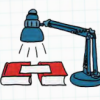
Light Bulb Challenge
Source Institutions
In this activity, learners explore the difference between compact fluorescent light (CFL) bulbs and traditional incandescent bulbs.
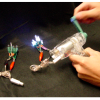
How can You Demonstrate the Efficiency of Different Light Bulbs?
Source Institutions
In this activity, learners actually feel the difference in energy required to light two different types of light bulbs: incandescent light and LEDs.

Power Up!
Source Institutions
In this online game, learners must purchase power plants for their city.
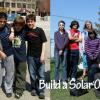
Build Your Own Solar Oven
Source Institutions
Learners follow directions to construct a solar oven that really cooks! The solar oven uses aluminum foil to reflect sunlight into a cooking chamber, which is painted black.

Wind Turbine
Source Institutions
Learners build a wind turbine and test it to see how much energy is created.
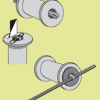
All Wound Up
Source Institutions
In this activity, learners build a racecar using only a rubber band, spool, straw, and paper clip! This racer is a classic toy that zips across a flat surface.
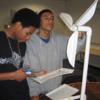
Whirling Windmills
Source Institutions
In this activity, learners are challenged to design and construct a windmill to harness the power of wind.
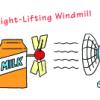
Blowin' in the Wind
Source Institutions
In this environmental engineering activity, learners build windmills using everyday items. The first challenge is to build windmills that spin when placed in front of a fan.
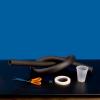
Build a Roller Coaster
Source Institutions
Learners design and build a roller coaster using simple materials. Learners experiment with potential and kinetic energy to get a marble to follow a track into a cup.

Backyard Biodiesel
Source Institutions
In this activity, learners make a small batch of biodiesel that will work in any diesel engine. Learners use an old juice bottle as a "reactor" vessel to chemically process vegetable oil into fuel.
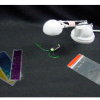
Why are Compact Fluorescent Bulbs More Efficient?
Source Institutions
In this activity, learners explore the relative efficiency of different bulbs, specifically incandescent vs. fluorescent.
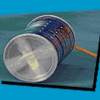
Spool Racer
Source Institutions
In this physics activity, challenge learners to make a rubber band-powered spool racer. Demonstrate principles of motion as well as potential and kinetic energy.

Can Car
Source Institutions
In this physics activity, challenge learners to make a race-car out of a coffee can and rubber band. Demonstrate motion, forces, kinetic and potential energy and friction.

The Carbon Cycle and its Role in Climate Change: Activity 3
Source Institutions
In this activity, learners explore the human influences on the carbon cycle and examine how fossil fuels release carbon.

Light Quest
Source Institutions
Learners test their "light-smarts" by playing a game called "Light Quest!" The game board represents an atom and each player represents an electron that has been bumped into the atom's outer unstable

Engineered Sports
Source Institutions
In this activity, learners explore the concept of how aerospace engineering has impacted sports, specifically exploring the design of golf balls.
